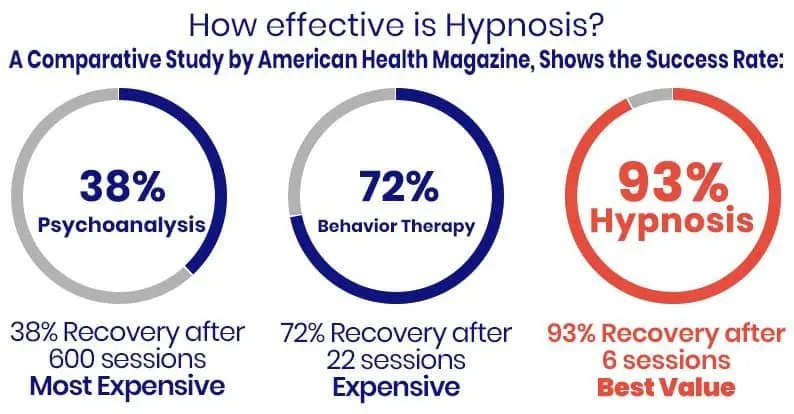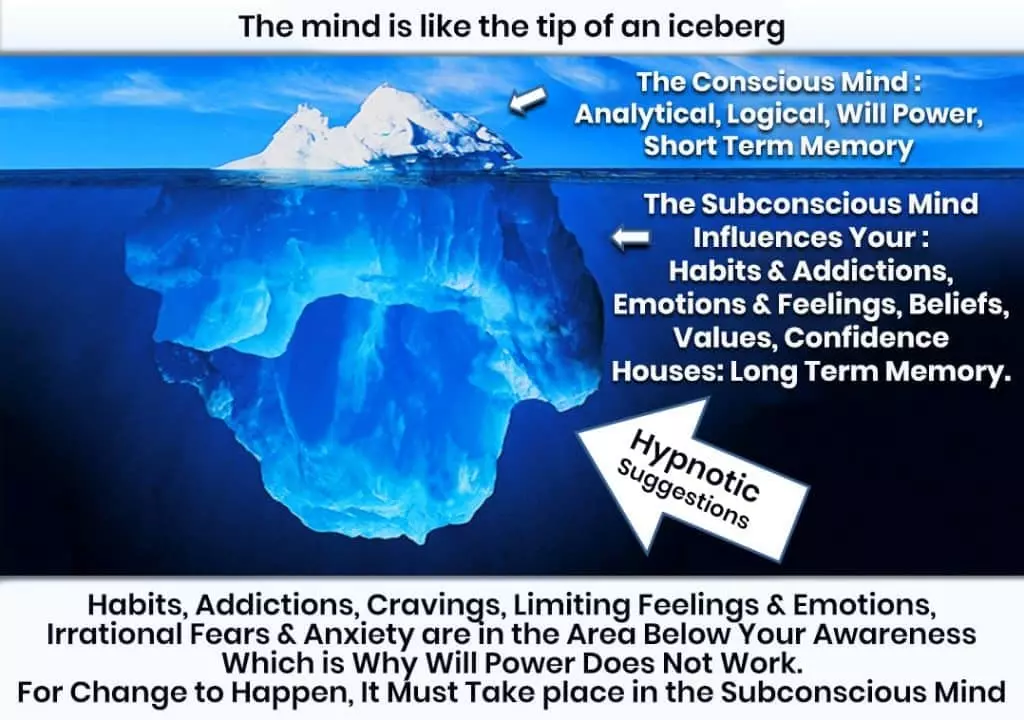Some of the most common questions asked about hypnosis include: What is the difference between hypnosis and hypnotherapy? Is hypnosis therapy? Or put differently, is hypnosis therapeutic? To answer these questions, we need to define what hypnosis is, and address common misconceptions. One common misconception is that hypnosis needs to be induced. In fact, we spontaneously experience hypnotic trance on a daily basis.
Spontaneous examples of Hypnosis
Hypnosis is a natural, and attentive state of mind that we automatically experience many times each day. In fact, we experience light hypnotic trance any time we get lost in thought or focus on a project and lose track of time. Another example is when we get excited while watching a movie. We are so engrossed in the movie that we get excited when 007 is fighting, even though we know it’s not real.
What is hypnotic trance?
Hypnotic trance is an altered state of heightened awareness and concentration. This state bypasses the critical factor, which is commonly referred to as the analytical mind, and allows access to the unconscious mind. The unconscious mind, also known as the subconscious, stores every experience you’ve ever had even though you may not be able to remember them consciously. It also initiates responses, beliefs, desires, and habits based on your past experiences.
Brain Activity during Hypnosis Therapy
A study conducted by the Stanford University School of Medicine showed that 3 areas in the brain changed while subjects were guided into hypnosis. Brain activity and blood flow was monitored by magnetic resonance imaging (M.R.I.). They learned that subjects experienced an increased mind body connection, and we’re highly absorbed and dissociated in the hypnotic trance state. This dissociation helps a hypnosis practitioner to give directions to the unconscious mind free from analytical interference.
How is formal hypnosis induced?
Nonspontaneous hypnotic trance is induced by a certified hypnotist. It is common for a hypnotherapist to have the patient imagine a familiar setting, relax various parts of the body, while using deep breathing techniques. Confusion and overload techniques may also be used to guide the client into a relaxing and dissociated state. Once the hypnotic state is achieved, suggestions/directions are given to the unconscious mind to address the client’s goal or challenge.
Is Hypnosis a form of Brain Washing?
One of the most common misconceptions is that hypnosis therapy is a form of mind control. This is likely because of the way it is portrayed on TV and in the movies. In reality, patients remain aware of their surroundings, and what is being said while in hypnotic trance. Any instructions that are not in line with the client’s true desires and values are ignored.
Is hypnosis therapy?
The mental health community considers hypnosis to be a therapeutic technique that is utilized by some psychiatrists and psychotherapists. Hypnosis can help clients improve conditions that include, but are not limited to, insomnia, anxiety, quit smoking, I.B.S., depression, weight reduction, PTSD, and chronic or acute pain. So, is hypnosis therapeutic? Merriam Websters definition of therapeutic is “having a beneficial or curative effect on the mind and/or body”.
Hypnosis versus Cognitive behavioral therapy
Traditional therapy, like Cognitive behavioral therapy, is considered the gold standard in psychotherapy. C.B.T. helps patients create coping mechanisms and strategies to deal with the presenting problem. Hypnosis trains the unconscious mind to automatically respond in a healthy and appropriate way to the challenge. Studies show that clients who undergo Cognitive behavioral therapy along with hypnotherapy see better results. However, patients undergoing C.B.T. alone can expect to spend months, and in some cases years, in therapy. Hypnosis, on the other hand, requires 2-8 sessions on average, to experience the desired change.

Hypnosis versus hypnotherapy
Many people think that hypnotherapy and hypnosis are one and the same. Hypnosis is a state of heightened relaxation and awareness. Hypnotherapy is a therapeutic technique utilized by mental health care professionals to help patients. So, what is the difference between a hypnotherapist and a certified hypnotist?
Hypnotherapists and Certified Hypnotists
Hypnotherapists are mental health care professionals who have received hypnosis training. In some cases, the training they receive is extensive, while in others it may be limited to a single class. Certified hypnotists are practitioners who have devoted their life’s work to the practice, and often have years of training and experience. With that said, there are many great hypnotherapists and certified hypnotists who help patients every day.
Many states, including New York, require certified hypnotists to avoid describing their work as hypnotherapy or therapeutic. They typically describe their work as non-therapeutic hypnotism for this reason.
Scientific data supporting hypnotism
15 scientific studies showed that hypnosis was an effective treatment for anxiety. Another review of scientific studies found hypnosis to be an effective and promising treatment for sleep issues. Lastly, another study demonstrated that hypnotherapy helped obese subjects lose weight during the trial as well as after the study was competed. There are many other scientific trials that support the benefits of hypnosis.
Regardless of how it is defined, hypnosis can help clients in a myriad of ways. It is a natural and safe modality to be seriously considered.




